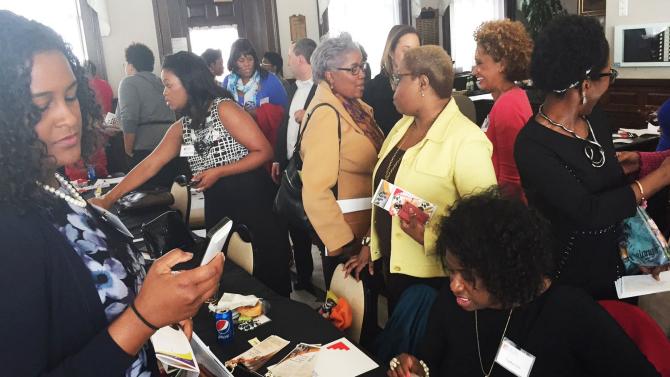
Power, policy and mobilizing the political influence of African-American women. That was the focus of a lunchtime meeting of influential black women in Washington this week.
In the ornate parlor of the Dorothy Height Building, between the Capitol and the White House, more than 40 women met to discuss the role of black women in politics. That subject is the central focus of Higher Heights, an energetic five-year-old organization working to mobilize and elect black women.
Black women led all demographic groups in voter turnout in the last two presidential elections, 2008 and 2012. In 2013, even without the first black president on the ballot, black women were the No. 1 demographic group in Virginia’s governor’s race, which saw a razor-thin win for Gov. Terry McAuliffe.
The founders of Higher Heights, Glynda Carr and Kimberly Peeler-Allen, informed attendees of their short-term and long-term goals, as well as their membership strategy, before opening the floor to hear ideas from the group.
“What does victory look like at the end of the 2016 presidential campaign?” was a central question posed by L. Joy Williams, a member of Higher Heights’ founders circle and president of the Brooklyn, N.Y., NAACP.
The women gathered were diverse in age and background. Attendees included Donna Brazile, Barbara Williams-Skinner, Julianne Malveaux, Chanelle Hardy, Waikinya Clanton, Leah Daughtry, Stefanie Brown James and Janaye Ingram.
“How do we harness our power? How do we use this moment as our first black president winds down his term? How do we use power and how do we empower others?” said Brazile, the first black woman to run a presidential campaign in U.S. history.
In 2014 a record 25 black women ran for statewide office, including five women in Georgia alone. The current U.S. House of Representatives includes 20 black women, the most in U.S. history.
For the 2016 cycle, at least two black women will be running for U.S. Senate: California Attorney General Kamala Harris and Rep. Donna Edwards (D-Md.), and a third, Rep. Robin Kelly (D-Ill.), is considering it.
Though the numbers are growing, only 35 black women from 15 states have ever served in Congress over 239 years. The focus of Higher Heights will be to increase those numbers.
“It takes supporting our candidates and building advocacy organizations,” Higher Heights co-founder Carr told The Root Tuesday.
“We need to move black women up the leadership ladder. The question becomes how do we build capacity and a national political infrastructure to harness black women’s political power and leadership potential? At a very critical time, the road to 2016, there’s an opportunity to advance our politics, our policies and our leadership. But it takes building infrastructure and supporting candidates and advocacy organizations,” Carr said.
The group is asking women to become founders by donating $1,000, with the goal of raising $1 million. Because political power has become even more money-centric since the U.S. Supreme Court’s infamous Citizens Uniteddecision in 2010, Higher Heights is focused on strategies not only for fundraising but also for developing localized ways to reach voters.
“The way you do it is you go into their homes and beauty parlors. When you reach black women, you reach the black community,” Brazile said as heads nodded in agreement.
The meeting took place in the historic Dorothy Height Building, where Height and Mary McLeod Bethune promoted the power of unified black leadership through the National Council of Negro Women, the first black-controlled advocacy group located in D.C. In the new tech-centric age of big-money politics, Higher Heights is seeking to extend that legacy into the new millennium.
Lauren Victoria Burke is a Washington, D.C.-based political reporter who writes the Crew of 42 blog. Follow her on Twitter.















